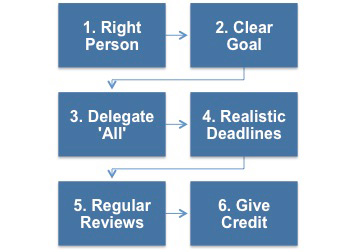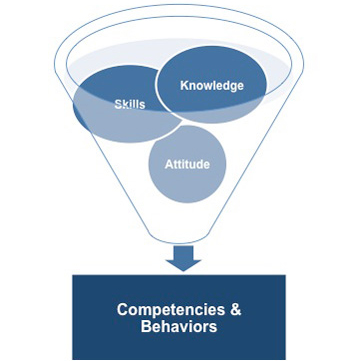The Six Stages of Delegation
There are six practical stages you should follow so that your delegated activities are successfully completed. This logical process allows you to clearly define your requirements at each stage and will ensure that your personal productivity is optimized.
In order to prevent any element of confusion or doubt influencing the process, it is essential that you communicate with total clarity at each stage, not only with the 'right person,' but everyone who plays a part in ensuring the task is completed as expected and in a timely manner. This clarity is vital whether your communication is written or verbal.
 |
1. Select the right person for the job
As a manager, it is essential that you have an accurate picture of your team members' individual KSA's (Knowledge, Skills and Attitude). You will be able to assess these by watching and evaluating the competencies and behaviors an individual displays in different situations.
The right person for you to delegate to will already exhibit many of the behaviors that are required to perform the task that you want to delegate. This can be seen in the way they deal with unexpected circumstances or handle other members of your team to defuse potentially damaging situations.
 |
With this knowledge, you will then be able to select the 'best' person to complete the task that you want to delegate, in the manner that you expect.
The team member must feel that the task they have been assigned is commensurate with their role description and level of authority. In addition to providing a challenging opportunity to improve, they must be allowed to use their skill and initiative.
If these conditions are not met, then the team member is likely to reject the responsibility and try to actively or passively avoid doing the task.
2. Provide a clear goal
It is your responsibility to provide the team member with all the information they will need to understand exactly what is expected of them and to perform the task successfully. It is important that the brief you give provides a clear understanding of the importance of the task.
An essential aspect of your brief is that you must clearly define what you expect from the job you are delegating and that it meets the SMART goal-setting criteria (described in 'Effective Goal Setting' which can be downloaded from www.free-management-eBook s.com). This includes how their, and your, success will be measured. With this knowledge, the team member can clearly understand what the goal is, as well as what you expect from them.
Try not to express your instructions in vague terms such as 'deal with,' 'coordinate,' or 'network with.' For example, 'I'd like you to coordinate with them from now on' is virtually meaningless and leaves too much room for misinterpretation.
As part of your briefing process, make sure the team member understands exactly what you want them to do. Get them to ask questions and then reframe or rephrase the task description in a way that gives them ownership of it and gives you confidence that they fully understand it.
3. Delegate the whole job to a single team member
One of the most serious mistakes that you can make when delegating work is to split the task up and give it to more than one team member. The effect of this is to add considerable confusion to the whole situation. Therefore it is crucial to ensure that the individual understands that the task is their sole responsibility to deliver in the most appropriate way to guarantee success.
If several people become involved in performing different aspects of the task, it becomes difficult for individuals to see where their individual responsibilities begin and end. This results in elements of the task potentially being duplicated or left unperformed as individuals think it is someone else's responsibility.
If the person you have delegated to decides that they in turn wish to delegate parts of it, then that is for them to decide and accept the responsibility of ensuring success.
4. Set a realistic deadline if appropriate
When briefing the team member to whom you have delegated, you must clearly state what the deadline is and the reason for that timeframe. There may be circumstances when you are delegating a task involving a third party where you are unable to offer a time period that you may feel is more appropriate. The reasons for this timeframe must be explained to the individual to ensure their acceptance of the task.
Setting extremely challenging deadlines usually has the opposite effect from the one intended. If a team member starts to doubt their ability to finish on time, they may lose motivation to even try. Similarly, setting a strict deadline where there are too many unknown factors may have the same result of impairing motivation.
You should also make sure, where circumstance allows, that any deadline does not get in the way of exploring all the options available for task completion. For example, the best option may involve choosing an off-the-shelf solution rather than developing something in-house.
The deadline could be very different depending on the path chosen. Remember, once you have set the deadline, it is difficult to see any options that don't fit closely within your predefined time limit, particularly if they can be done in a much shorter timeframe.
5. Perform periodic reviews
To ensure successful delegation of your task, you must clearly identify as part of the brief the key points of the task or the dates when you want feedback about progress. This allows you to become aware of potential issues or problems the person you've delegated the task to may have and to help them resolve them, before they become damaging to the task's success.
It is your job to make sure that the task is on track and you will need time to act if it is necessary to influence the project's direction or the team member's decisions. It is only through regular, spaced, and pre-defined reviews that you will be informed enough to correct any problems before they get out of control.
Conducting a Task Debrief following the completion of the task enables both you and the person who performed the task to have an honest appraisal of the whole event. This allows them to have recognition of their personal development and helps you to understand how well you conducted your task delegation. From this debrief you will be able to judge what went well, what went poorly, and areas for improvement.
Throughout the whole process of delegation, it is important to be aware of the so-called over-reporting trap, which is described later in 'Monitoring Delegated Tasks.'
6. Give proper credit and recognition to the person that completes the job
Decide in advance how you will thank and reward the team member for their successful completion of the task. When a job is completed, it is important that you give full credit to the person that completed it. This provides them with the personal recognition of their achievement at both a team and corporate level.
If the project is not a success, you must assume full responsibility and as part of your Task Debrief evaluate what happened, how things developed, and the reasons as to why the team member was not capable of completing the project. Always try to learn from these experiences, so that next time you delegate more efficiently.
You may also be interested in:
Delegation of Authority | Principles of Delegation | Delegation in Management | Monitoring Delegated Tasks | Advantages and Disadvantages of Delegation.



